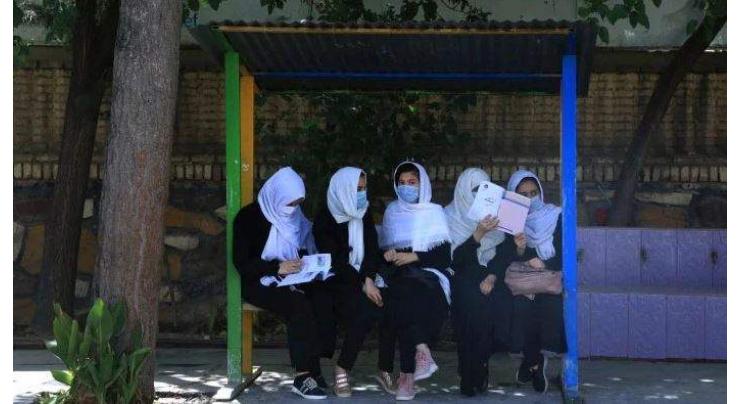
Afghan Private Universities Divide Classrooms Into Male, Female Zones
Faizan Hashmi Published September 06, 2021 | 04:48 PM

A number of private universities in Afghanistan have curtained off an area in classrooms for female students to sit separately from men, confirming fears that women's rights might be in jeopardy after the Taliban (terrorist organization banned in Russia) takeover, a local student told Sputnik on the first day of class
MOSCOW (UrduPoint News / Sputnik - 06th September, 2021) A number of private universities in Afghanistan have curtained off an area in classrooms for female students to sit separately from men, confirming fears that women's rights might be in jeopardy after the Taliban (terrorist organization banned in Russia) takeover, a local student told Sputnik on the first day of class.
The Taliban's ban on coeducation did not spare private universities. The radical movement has recognized women's right to education, but ordered separate learning spaces for male and female students in line with Sharia law.
Female students will have to be schooled either in separate classrooms or in the section of a common classroom separated by a non-transparent curtain from male classmates, the student said.
The Taliban also ordered female students in private universities to wear abaya and niqab, and finish classes five minutes earlier so as not to meet with men on their way out.
Only women will be able to teach female students, or, wherever this cannot be arranged, "elderly men" of good reputation, the student said.
The number of private universities boomed in Afghanistan after the overthrow of Taliban rule in 2001. Yet the social convention of keeping girls out of school has remained prevalent in the Central Asian country. Afghanistan has one of the highest number of children out of schools, child marriages and unemployment among the youth, which the United Nations says are all intertwined issues.
After the Taliban's takeover of Afghanistan, UN rights chief Michelle Bachelet described the radical movement's treatment of women and girls, including their access to education, as "a fundamental red line" in the international assessment of its commitment to human rights.
Related Topics
Recent Stories

Venezuela shuts Ecuador diplomatic missions over raid

France and Germany will slow eurozone down: IMF

UN to launch $2.8 bn global appeal for Gaza, West Bank

COAS, Saudi FM discuss bilateral cooperation in various sectors

Big industry grows by 0.06 % in February 2024

PTI's plan to destroy national economy has failed: Senator Talal Chaudhry

Fire at Copenhagen landmark 'under control'

Hub rally on April 28

Saudi delegation's visit to usher in new era of close cooperation: Prime Ministe ..

Erdogan says Netanyahu to blame for Iran's attack on Israel

Human traffickers gang busted in Mirpurkhas, 2 girls rescued

Man killed in Attock
More Stories From World
-
Denmark sells 24 used F-16 fighter jets to Argentina
25 minutes ago -
Split among Colombia guerrillas strikes blow to peace talks
45 minutes ago -
Barcelona v Paris Saint-Germain Champions League starting line-ups
2 hours ago -
Split among Colombia guerrillas strikes blow to peace talks
2 hours ago -

Venezuela shuts Ecuador diplomatic missions over raid
2 hours ago -

UN to launch $2.8 bn global appeal for Gaza, West Bank
2 hours ago
-

Fire at Copenhagen landmark 'under control'
3 hours ago -

Erdogan says Netanyahu to blame for Iran's attack on Israel
3 hours ago -

Macron recalls dark side of French WWII history in resistance tribute
3 hours ago -

Thousands rally in Georgia as parliament debates 'foreign influence' law
3 hours ago -

Dubai airport diverts flights as 'exceptional weather' hits city
3 hours ago -

Row erupts as Brussels orders shutdown of right-wing meet
3 hours ago







